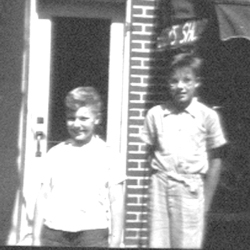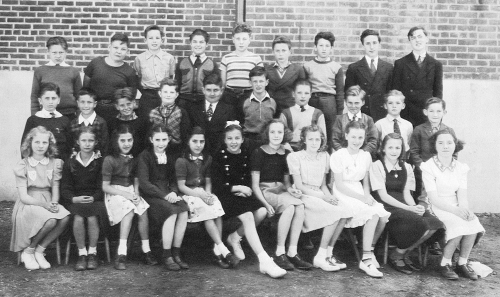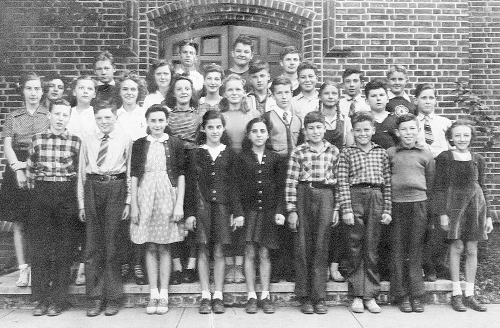|
I read voraciously. It was my ambition to read every book in
the public library. I made a start at it, but, unfortunately, authors
kept writing faster than I was reading.
For some reason, I attracted dogs. When I walked down the street, they
would come up, follow me and jump up and grab my sleeves.
Dad told me
that, in good weather, he would stand in front of the store and watch
me walk home, reading a book, ignoring the dogs following me and the
ones hanging from my sleeves. The cuffs on my shirt sleeves and jackets
were always frayed.
In school, one
day, the teacher told us that we were going to do an experiment. We
were all to stand, and when she gave us the signal, we were to shut our
eyes and stand for one minute. When we thought that the minute was
over, we were to sit down. I was the last to sit down, and the only one
who had come close to one minute. When the teacher asked how I timed it
so well, I told her that I had read that the average person breathes 16
times a minute, but when I had timed myself, found that 12
was closer to a minute, so I just counted 12 breaths. |

1940
Lee and Bob Nostrand |
Bob Nostrand was my best
friend. We met when I started
5th grade in
Farmingdale, and we went through junior high and high school together.
He was a good student, too. Through the years, we competed for top
academic honors. And like me, he was athletically challenged.
Bob's
father and his uncle owned a prosperous fuel oil delivery business.
They lived on the top of Lenox Hill, the only high point in
Farmingdale. Bob had access to his father's mimeograph
machine, so we
put out a newspaper, and, in Bob's basement, with other friends, put on
plays and skits, for which we charged admission. |
|

1941 Sixth grade homeroom graduating class. I'm in the middle of the
top row,
Bob is third from left in the same row. The two to his right aren't
very happy. |
|
Pearl Harbor was attacked on Sunday, Dec. 7, 1941. We
heard
about it on the radio. We followed the news and knew that we were at
war, but I didn't know what that meant. Monday was school as usual, and
as usual, I came home for lunch. Going back to school after lunch, I
could hear President Roosevelt's speech as I walked down Main Street
because many of the stores had their doors open. As far as I was
concerned, there weren't any changes in my life. In school, we were
taught how to handle incendiary bombs if there were any dropped in an
air raid - just take a shovel and scoop it into a waiting bucket of
sand. It was presumed that the shovel and the bucket of sand would be
nearby where the bomb landed. Not explained was how to get near all
that heat.
I don't know what the teachers thought. They carried on teaching us as
if there was no war, with just mentions when covering current events,
and not much of that. Maybe they thought we were safe because the
oceans kept the fighting away.
Farmingdale was the home of Republic Avaition, which
made the P-47
Thunderbolt fighter for the Army Air Corps. We were only 3 miles or so
from Bethpage, where Grumman was turning out the Wildcat, a Navy
fighter, and the Avenger torpedo bomber. My brother and I, and all of
the boys we
knew, became very knowledgeable about airplanes. Since we had important
war industry, we had overhead fighter cover during daylight hours.
P-47's were rolling off the assembly lines here, and we could hear the
machine guns being tested, but the fighter cover was Lockheed P-38's
brought in from California. The fact that neither the Germans nor the
Japanese had long range aircraft that could attack us made no
difference. That the Germans had no aircraft carriers and all of
Japan's were in the Pacific also meant nothing. We had our air cover,
and we learned how to handle incendiary bombs.
My 12th birthday was in November of
1941. In April of 1942, I was given
a birthday present that I hadn't expected - a bicycle. Apparently, my
parents decided that winter was no time to start me on a bike, so they
waited for the spring. The bike was my freedom to travel. Within
limits, distance no longer mattered. Bob already had a bike - three
speeds - so he could go up the hill sitting down while I had to stand
on the pedals and pump away - so we went visiting friends far and wide.
I frequently travelled to Hicksville, a 10 mile round trip, and to
Bethpage and Amityville. I wanted to bike to Brooklyn to
visit
Baba
and Aunt Esther, but I was concerned that I would not be allowed to.
I had joined the Boy Scouts when I turned 12. I told my parents that I
wanted to go to Brooklyn as part of my attempt to get a biking merit
badge. There was such a thing, but I was not the least bit interested
in getting one. I don't know what discussions they had, but I was given
permission - after all, I was 12, not just a little kid.
So, one Saturday in June,
during school vacation, I set off for
Brooklyn on my bike. I knew the way, so I didn't need a map. My mother
insisted that I take a lot of cherries to slake my thirst on the way. Loaded
with cherries and sandwiches, I headed off.
It took 5
hours to get there. I parked my bike in the alley next to the building
and I went upstaris to see Baba and Aunt Esther. They were surprised to
see me and Esther asked how I got there. I told her that I rode my
bike. She told me to stop kidding and tell her how I got there. I told
her to look out her kitchen window and she'd see my bike in the alley.
She did. She immediately went to the phone and called my mother, and
when the phone was answered, shouted, "Anna, are you crazy?" Realize
that a phone call from Brooklyn to Farmingdale was no easy or
inexpensive thing. Phone calls were reserved for matters of great
import. If you just wanted general communication, you wrote a letter or
a postcard. Phones were for local calls or emergencies only.
Of course, Esther would not permit me to bike home. On Sunday, we tied
the bike to the car and the whole family drove me home. That was one of
the few times that Nat ventured out to Long Island without getting lost.
|
|

1943 8th grade homeroom graduating class. I'm third from the
right in the next to top row. Second from right in the first row is
Herbert Freiman, who retired in the mid-1990's as vice-chairman of
Shearson Lehman Brothers. I haven't seen him since 1947, but I called
him in 2008 after I learned that one of his sisters had died. He told
me that I had been the bane of his existence in junior high and high
school because every time he brought home a test mark, his mother
wanted to know what I got. |
|
 
|
|